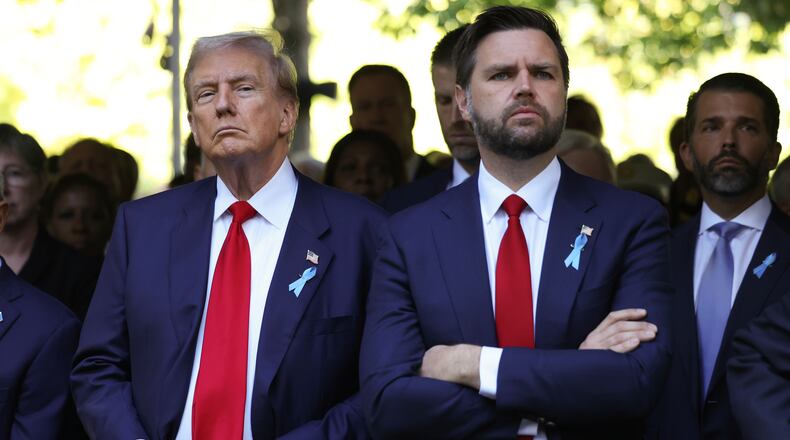Those requests for charges reference comments made by Trump and Vance about the Haitian community in Springfield killing and eating residents’ pets. Shortly after those claims were amplified by Trump, Vance and thousands of others online, the community was hit by a wave of bomb and safety threats.
“The conclusion of whether the evidence and causation necessary for probable cause exists to commence a prosecution of the alleged offenses is best left in the investigatory hands of the prosecution,” the judges wrote in their decision.
The judges said particular consideration should be given to “the strong constitutional protections afforded to speech, and political speech in particular.”
“The presidential election is less than 35 days away. The issue of immigration is contentious,” the ruling states. “Due to the proximity of the election, and the contentiousness concerning the immigration policies of both candidates, the Court cannot automatically presume the good faith nature of the affidavits.”
The court ruling states that this does not mean HBA executive director Guerline Jozef does not believe what she alleges, but brings into question whether her conclusions that Trump and Vance’s “political speech” are criminal are influenced by her personal experiences, “as opposed to an objective analysis of the alleged speech, the constitutional protections afforded to that speech, the alleged conduct occurring within the community, and a claimed nexus between the speech and that conduct.”
Credit: AP
Credit: AP
Under Ohio law, a private citizen seeking to “cause an arrest or prosecution” can file an affidavit with “a reviewing official” — a judge, prosecuting attorney or magistrate — to have them review the facts and decide if a complaint should be filed.
The Haitian Bridge Alliance asked the court to find probable cause for the charges and issue arrest warrants for Trump and Vance.
According to the document, in a felony case, if the court questions good faith or probable cause, it will refer the case to the prosecutor for further investigation. Unless it issues a warrant for Vance and Trump’s arrests, the court must refer the case to the prosecutor.
The HBA’s updated filing alleges that free speech cannot be used as a defense, as Trump and Vance’s actions disrupted public service.
“Trump and Vance engaged in a purposeful pattern of conduct to impede public services in Springfield. Despite seeing that Springfield was suffering from repeated bomb threats, evacuations, hospital lockdowns, necessity of state-trooper deployment, and closures of government buildings, they continued to double, triple, and quadruple down on their false claims,” the affidavit stated. " ... Trump’s and Vance’s refusals to stop, despite serious chaos they were inflicting and the governor’s and mayor’s pleas, highlights their criminal purpose in spreading these lies. The chaos caused was the purpose, and the First Amendment affords no protection for that campaign of criminal conduct.”
The affidavit alleges that Trump and Vance’s actions “were not just hateful, they were calculated to stir alarm and emotional distress in the community.”
Lead counsel for the HBA Subodh Chandra said in a statement that the organization is “disappointed” by the referral to the prosecutor and the “irregular process” the court followed to reach its decision. It raised concerns about the special procedure created to handle the case.
A separate citizen-initiated criminal case against the Springfield woman who made the initial social media post about Haitian immigrants stealing and eating pets was also assigned a special case.
Chandra argued that the court is obligated to hold a hearing in accordance with case law, and that it did not address Ohio law the HBA presented that shows the First Amendment “doesn’t protect Trump’s and Vance’s conduct.”
The court ruling also raised the concern of strong constitutional protections of free and political speech.
According to a concurring opinion by Judge Stephen Schumaker, the case does not require a hearing. Schumaker’s opinion went further into the question of proving certain actions.
“The Court acknowledges the difficulties of proving a negative. There is significant difference however, between stating that there are no verifiable reports that a statement is true and proof and/or probable cause that a statement is false,” Schumaker wrote. “This Judge has tremendous respect for the officials making the above and similar statements but if any of the officials voiced the opinion that the statements at issue were false, those statements are in the form of opinion.”
Chandra called the decision “condescending and cruel to Haitian immigrants,” saying the concurring opinion “seems to pretend that somehow, it’s a coin toss as to whether Trump’s and Vance’s lies about Haitian immigrants are true and whether the governor, mayor, and city manager truly said those lies are false.”
About the Author


